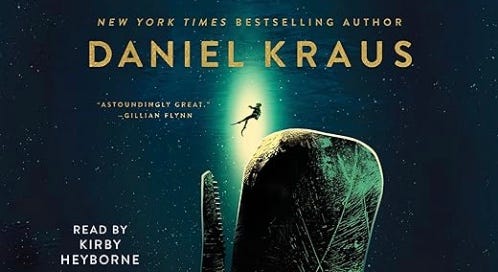BookLife Review by Carol O’Day: Whalefall (Daniel Kraus author)
Science-fiction, adventure, scuba diving, sperm whale, giant squid, trapped in belly of a whale, father-son relationship, resentment, grief, recovery
There are two books with similar names causing a buzz on readers’ lists: This book, Whalefall by Daniel Kraus, and Whale Fall by Elizabeth O’Connor. Watch for a review of O'Connor's book in a future installment of BookLife: Reviews for Readers.
Daniel Kraus’ Whalefall explores a curiously specific and fantastical but theoretically possible event–a young scuba diver goes in search of his father’s remains at a favorite dive spot off the northern California coast, is swallowed by a whale, and survives. The reader suspends her disbelief to enjoy this Jonah-and-the-Whale tale. Jay Gardiner is an angry young man, reeling with guilt for abandoning his family when his father became terminally ill, and with grief over his father’s death. The only son of local legend and diver, Mitt Gardiner, Jay grows up in his father’s long shadow. Mitt’s passion for diving and sea life, and whales in particular, consumed his life, and his attention. Mitt struggled to hold a job, chafed at the constraints of marriage and fatherhood, and relentlessly tried to ignite a passion for the sea and diving in his son. Jay comes of age certain that if he could not match his father’s single-minded passion for diving, he would never please his father or garner his father’s love, approval and respect.
Several months after his father’s suicide at sea, Jay undertakes a solo dive in search of his father’s remains. He hopes to deliver Mitt’s remains to his mother and sisters for burial, and as a peace offering to them for his absence during Mitt’s illness. Despite his dive training, Jay encounters both a jumbo squid and a sperm whale on his dive. He becomes entangled in the squid’s tentacles and he and the squid are swallowed by the whale. What happens from there is extraordinarily specific, full of marine and whale biology factoids and yet is oddly gripping.
Kraus numbers his chapters with digits that correspond to the declining amount of air in Jay’s air tank. The psi ticks down in a death spiral from his start with a full tank at 3000 psi to a nearly fatal level as the book draws to a close. Jay’s journey through the literal belly (more accurately bellies) of the whale is graphic. Kraus details the whale’s bodily functions, the crushing peristalsis of its abdominal walls, the texture of its internal organs, the sounds of its heart and lungs, and the detritus filling its stomachs. Jay is awash in marine life, slime and blood, and ocean trash and debris. As Jay is moved further into the bellies of the beast, his air supply dwindles, and he sustains injuries to his own skin, bones and internal organs. He engages in a mighty struggle to survive.
While he is trapped, Jay imagines he hears his father’s voice which he also conflates in his near-delirium with the “voice” of the whale. The lessons his father taught him about diving, and about the biology of whales come flooding back. Jays draws on these lessons in his attempt to survive. When whale is attacked by orcas (aka killer whales) while Jay is trapped in its belly, Jay fears the whale might either breach the ocean's surface too rapidly, preventing Jay from ascending slowly so as to prevent the bends, or that it will die from the attack and a “whalefall” (the term for a whale sinking to the floor of the ocean upon its death) will follow, signalling Jay’s death as well. Through the ordeal, Jay begins to appreciate and forgive his father, and to regret some of his own teenaged choices.
Daniel Kraus is a successful writer. Together with Guillermo del Toro he authored the book that became the Academy Award-winning film, The Shape of Water. Also in collaboration with del Toro he wrote Trollhunters which was adapted for television by Disney. He received the Odyssey Award for two of his prior novels, Rotters and Scowler. True to form, Whalefall is cinematic. It is an extraordinary adventure story with echoes of Moby Dick and the biblical Jonah-and-the-Whale tale. The first half of the novel leans a little too heavily on the angry young teen trope; it cries a bit too much in the key of “Woe is me.” Jay’s recurring rants about feeling monstrously misunderstood by his father, the legendary diver, and his Sisyphus-like effort to justify his own abandonment of his family at the time of the illness is one-note repetitive and wears a bit thin. However, midway through the novel, Jay stops whining, as he must focus not on his grievances but on how to survive and escape the belly of the whale. With this shift, the novel becomes more enjoyable. Whalefall is worth the read to learn all you ever wanted to know (and perhaps more) about whale biology and scuba diving. Alongside the grand adventure, the novel probes the challenging father-son dynamic, in grief and recovery.
Please support BookLife: Reviews for Readers and independent book sellers by purchasing Whalefall using the Bookshop.org link below.
For more book reviews and writing by Carol O’Day visit BookLife: Reviews for Readers on Substack, www.caroloday.substack.com.





